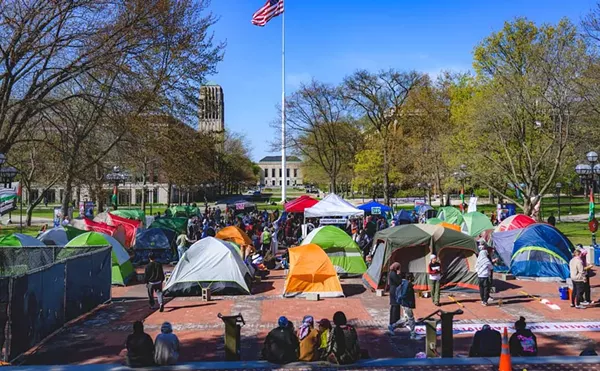
Audio By Carbonatix
[
{
"name": "GPT - Leaderboard - Inline - Content",
"component": "35519556",
"insertPoint": "5th",
"startingPoint": "3",
"requiredCountToDisplay": "3",
"maxInsertions": 100,
"adList": [
{
"adPreset": "LeaderboardInline"
}
]
}
]
Ismael Ahmed, director of the Michigan Department of Human Services, is mostly bald. Which is a good thing, because despite his usually calm exterior, I'd be fearful he'd be tempted to tear his hair out in the months ahead. I certainly would, in his shoes.
Michigan is facing an explosion in poverty, in need, in families slipping below the water line, just at a time when he knows he is going to have to do much, much more with less money.
"There's an explosion of need out there," Ahmed told me last week. "We've seen a dramatic increase in poverty in the state. More than one-fourth of children are living in poverty.
"More than 2 million people are living below the poverty line, and that's still increasing. And when you count people who are working but who just don't make enough to live, that increases to about a third of the state."
Normally that would be reason for him to ask for more money to do his job, but there is no more money. Worse, the state is facing the mother of all deficits in the next fiscal year — at least $1.5 billion — and huge budget cuts are coming.
Thanks to rising unemployment, Ahmed's department was mostly spared in the first go-round of cuts, though DHS did lose $100 million, mostly for after-school programs. But more cuts could well be coming if the state budget situation worsens; in the meantime, he is going to have to do more with less.
Make that a lot more. When it comes to people being down on their luck, we most likely ain't seen nothing yet. Some of those who are certain to lose jobs — even if the domestic automakers all survive — haven't lost them yet. Others are still existing off hope, savings and unemployment compensation, while it lasts.
"It's kind of like the knot in the snake," Ish said. "We look at filings for unemployment compensation and figure we will usually see them [asking for help] about six months later."
He paused. "Frankly, the need is growing so drastically that I'm not sure there is enough money in government entirely to meet the kinds of needs our state faces," he added, whether it is in the area of health care, worker retraining or just the general social safety net.
I've known Ahmed for years, and he is normally a man of sunny, almost unflappable disposition. But he can't push his biggest worry away these days; the "worry that, from a social services standpoint, we won't be able to do what we need to do."
Not that he lacks all hope: "The stimulus package is going to be tremendously helpful, with everything from food stamps to worker retraining funds. But — it may sound strange for a guy in government to be saying this — but not everything can be done by government."
Actually, probably no one knows that better than Ismael Ahmed, the highest-ranking Muslim ever in state government. He's a thoroughly American Brooklyn cab driver's son who has lived in Michigan ever since he was a small child, in the 1950s.
Back in 1971, when Arab-Americans were a small and mainly ignored minority in Dearborn, Ahmed helped found ACCESS, the Arab Community Center for Economic and Social Services. Soon, he was running ACCESS full-time. Eventually, it grew into one of the largest and most successful private social welfare agencies in the world; President George H.W. Bush (the less bad one) gave it one of his Points of Light awards in 1992.
He knows how to create public-private partnerships, and he knows the state is going to have to do more of that too; some of that is already going on with child welfare services. But he also knows that if "we are ever going to have the kind of world we would all like to have," that we'll need more than a bunch of enlightened state and national bureaucrats trying to get us there. What really has to happen is that we have to all get it too.
"You need a large movement of people," Ahmed said, people who care about society as a whole. That, he reminded me, is how they managed to get politicians to pass Social Security.
That happened during the Great Depression, when poverty was either a fact of life or one paycheck away for the vast majority of people. Desperate need was a little harder to ignore back then. Somehow, I wouldn't be surprised if it is going to be a lot harder for many of us to ignore, a few months or so from now.
Wacky idea of the week: We've just had the first of our four mayoral elections this year, and since I am writing this before the votes were counted, I have no idea who is in the runoff. What I do know is that the election cost the starving city more than a million bucks, and that there will be another in May.
Then there will be another in September and a final in November. Each of them, terribly expensive.
So how about this: I suggest whoever finished second this week just drop out. That's right. Drop out and save the city some badly needed dough. This is for a term that lasts only till the end of the year, for Bog's sake. Any of the top contenders could run the city for nine months without us having to worry the world will fall apart.
Then the second-place finisher who made this heroic sacrifice would be well-positioned to run in the September primary for the four-year term, an election that constitutionally must be held.
Hey, if I lived in the city, anyone who voluntarily saved me money and the bother of another election (three a year ought to be enough, yes?) would be more than OK with me.
Fits and giggles: The Detroit Newspaper Monopoly — oops — "Media Partnership" announced that it will stop home delivery of the newspapers on Monday, Tuesdays, Wednesdays and Saturdays, beginning the week of March 30. However, they have your best interests at heart. Possibly belatedly stirred by my brilliant (if a teensy bit sardonic) observation that your average senior citizen doesn't want to do her crossword puzzle as a PDF file, the newspapers are reaching out!
According to an internal memo, "Beginning mid-March, Wayne County Community College will offer free training classes at all their campuses for seniors who want to learn more about using the digital editions. Classes will also be offered at senior recreation centers and libraries in Oakland and Macomb counties." If you want more information about that, the memo says, call one Deb Scola. In the interest of helping Gannett, you can call 313-222-6400 and ask to be connected. Tell her Jacky sent you.
Incidentally, the monolith also announced that if you want "same-day" mail delivery of the Freep the four days a week it doesn't come, you can get that for $19.33 a month. I plan to sign up, and report to you on how "same-day" mail delivery is. (Of course, the newspapers can always say I got it on the "same day" it arrived.)
But as a patriot, I want to proclaim that the rumor that the price was chosen to remind us of the worst year of the Great Depression is false anti-Gannett propaganda, and should be suppressed.
Jack Lessenberry opines weekly for the Metro Times. Contact him at letters@metrotimes.com




